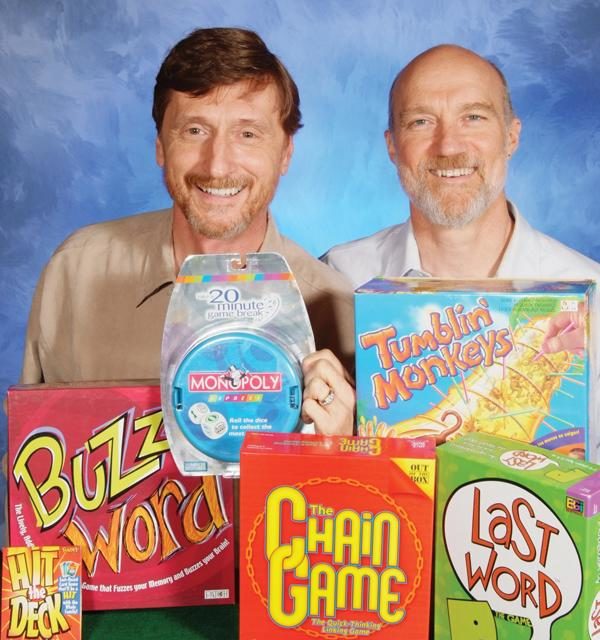He should know. Steer not only spends his days and nights playing games, he and Garry Donner invent them under the banner Random Games & Toys.
“This is a better job than anyone could possibly imagine,” Steer says–though the business is “feast or famine. We’ve had several periods when we’ve made a lot of money, followed by very dry spells when we don’t make much.”
Donner and another partner launched the company in 1974–and ran out of money in 1976. That’s when Steer, a computer engineer, joined the company. He and Donner both worked at the Southeast Michigan Council of Governments and took the same commuter train to Detroit–“we played games together on the train and at lunch,” Steer recalls. “I agreed to become a partner, but I can’t say I really expected anything to come of it. We were outsiders in the toy business, and none of us had ever worked for a toy company.” Soon after, Donner’s original partner left.
Random finally licensed its first games in 1979: a “heroic fantasy board game” called Wizard’s Quest, and Poker Royal by Hoyle. But it was Pocket Trivia, in 1984, that really jump-started the company.
According to Bob Moog of manufacturer University Games, until the early 1980s companies shied away from games with questions players could answer only once. But when Trivial Pursuit took off, Random Games & Toys introduced simple decks of cards that offered long lists of questions and answers on each side. Hoyle bought it and sold ten million decks in two years. “We asked everyone we knew to come up with questions and answers, promising to pay them if we used their questions,” Steer recalls.
Based on the strength of Pocket Trivia, Donner gave up his day job in 1985. Soon after, at the annual American International Toy Fair in New York, a Mattel vice president was so impressed with a new Random game that he offered a $100,000 option if Random would refrain from showing it to anyone else.
Steer immediately quit his day job. But “the VP was fired shortly after our agreement, and we never saw a dime,” he says, shaking his head. “So, we tightened our belts and arranged for a line of credit while we still had earnings from Pocket Trivia.“
In 1987, the company brought in only $18,000, but eventually persistence paid off. “We went through a lot of reserves before we sold Travel Baffle Memory, a matching pairs game that offered more than 100,000 possible board layouts,” Steer says. “Hasbro loved it and sold a ton of them.”
Random’s games take an average of thirty to sixty hours to develop and then much more time to sell. “The business has changed over the years,” Steer says. “We have fewer companies to show product to, but new ones are popping up on a regular basis.”
The business cycle begins in the fall, when they present games to manufacturers for the next year’s Christmas season. They firm up contracts in the spring and spend July and August thinking of new products for eighteen months in the future.
“One thing we’re very successful at is inventing extensions of existing franchise games,” Steer says. “We came up with Travel Memory, Travel Candy Land, Travel Chutes and Ladders, and Express versions of Scrabble, Monopoly, Clue, and Sorry.”
And they’ve been very lucky, he says, that “a number of our games have stayed on the market a long time.” Tumblin’ Monkeys, where players try to remove sticks from a plastic tree without dislodging the cocktail monkeys hanging from them, has sold fifteen million copies over twenty years.
“Most inventing starts in your head, and pretty quickly it’s reduced to a playable game,” Steer says. “We start with three-by-five-inch cards because most of our games are knowledge-based–‘Tumblin’ Monkeys is the exception.”
When inventors began asking for help selling their games, Donner and Steer decided to become agents, too. “We represent ourselves and other inventors all over the world,” Steer says.
“When it comes to inventing new games, the idea is king–and the path to market is full of luck, skill, and more luck,” he says. “So many factors go into success in this field: a good fit with the right company, luck, persistence, trend-watching, and timing.
“Inventing games is not for the fainthearted. I always advise new inventors not to quit their day jobs.”


